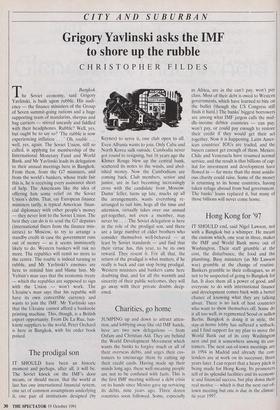Charities, go home
JUMPING up and down to attract atten- tion, and lobbying away like old IMF hands, here are two new delegations — from Oxfam and Christian Aid. They are behind the World Development Movement which wants the banks to forgive much or all of their overseas debts, and urges their cus- tomers to encourage them by cutting up their credit cards. Having made up their minds long ago, these well-meaning people are not to be confused with facts. This is the first IMF meeting without a debt crisis on its hands since Mexico gave up servicing its debts, nine years ago. Three dozen countries soon followed. Some, especially in Africa, are in the can't pay, won't pay class. Most of their debt is owed to Western governments, which have learned to bite on the bullet (though the US Congress still finds it hard.) The banks' biggest borrowers are among what IMF jargon calls the mid- dle-income debtor countries — can pay, won't pay, or could pay enough to restore their credit if they would get their act together. Now it is happening. Latin Amer- ican countries' IOUs are traded, and the buyers cannot get enough of them. Mexico, Chile and Venezuela have resumed normal service, and the result is that billions of cap- ital for investment and development have flowed in — far more than the most assidu- ous charity could raise. Some of the money is returning to its home countries, having taken refuge abroad from bad government. The banks' loans replaced it, but many of those billions will never come home.


























































 Previous page
Previous page